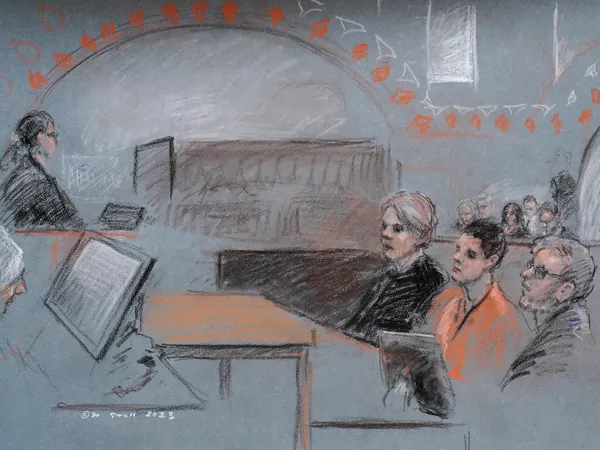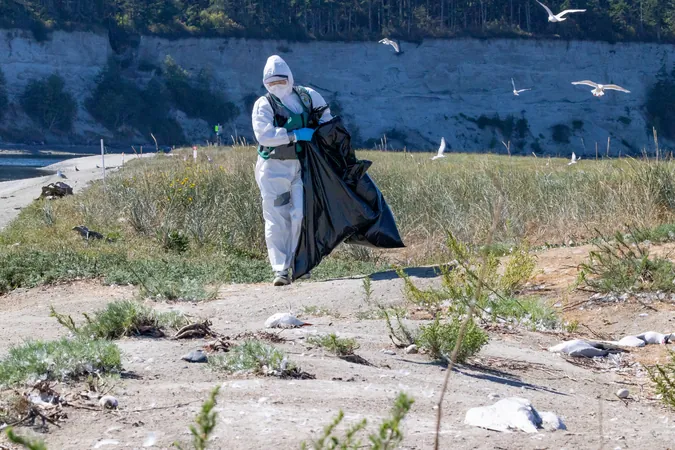
Pentagon Leaker Jack Teixeira Faces 15-Year Sentence: A Cautionary Tale for National Security
2024-11-12
Author: Olivia
Introduction
In a landmark case that raises serious questions about national security and the protection of classified information, 22-year-old Jack Teixeira, a former Massachusetts National Guard member, has been sentenced to 15 years in prison. This sentence was handed down by a federal judge in Boston after Teixeira pleaded guilty to six counts of willful retention and transmission of national defense information under the Espionage Act.
Details of the Case
Prosecutors painted a damning picture of Teixeira’s actions, asserting that he committed one of the most significant violations of the Espionage Act in American history. They sought a harsher penalty of 17 years, emphasizing the gravity of his betrayal: “The defendant took an oath to defend the United States and protect its secrets—secrets vital to national security and the safety of American servicemen and women abroad,” they argued.
Teixeira's Background and Role
Teixeira served in the 102nd Intelligence Wing at Otis Air National Guard Base located in Cape Cod and had a role as a cyber-transport systems specialist. His professional background put him in a position of trust, tasked with maintaining military communication networks. However, he misused this position by leaking sensitive documents to the messaging platform Discord, beginning with manually re-typing copies of classified information before escalating to photographing documents marked “SECRET” and “TOP SECRET.”
Contents of the Leaked Information
The leaked materials revealed significant data, including troop movements in the Ukraine war and sensitive intelligence regarding Israel's Mossad spy agency. Additionally, Teixeira faced scrutiny for sharing information on U.S. adversaries’ plans that could endanger American forces overseas. The incident sent shockwaves through the Biden administration, which scrambled to manage the fallout and address concerns about the nation’s capability to safeguard its classified information.
Defense and Sentencing
In court, Teixeira’s defense team argued for leniency, proposing an 11-year sentence. They contended their client had no political agenda or intentions to spy for foreign adversaries. They portrayed him as a young man trying to share information to educate his peers about global events amid the ongoing conflict in Ukraine, likening it to a pivotal moment for his generation similar to World War II or the Iraq War. Despite having no prior convictions, their appeal for understanding fell short.
Prosecutors' Counterarguments
Prosecutors pushed back, stating that Teixeira’s mental health considerations, including a post-arrest diagnosis of “mild, high-functioning” autism, were irrelevant to discerning his moral culpability. They insisted that he was fully aware of the implications of his actions.
Teixeira's Apology
In a moment of remorse, Teixeira addressed the court, expressing deep regret for the harm he caused to his family, friends, and potentially, national security. “I’m sorry for all the harm that I brought and caused,” he stated, accepting full responsibility for his actions.
Conclusion and Implications
Teixeira’s case serves as an alarm for both military personnel and civilians regarding the critical importance of protecting classified information. As the judicial process concludes, the ramifications of his actions will likely reverberate throughout military and government circles, provoking a broader discussion about safeguarding sensitive data against personal negligence. With national security on the line and more questions than answers, this event may very well secure its place in the annals of espionage-related legal precedents.









 Brasil (PT)
Brasil (PT)
 Canada (EN)
Canada (EN)
 Chile (ES)
Chile (ES)
 España (ES)
España (ES)
 France (FR)
France (FR)
 Hong Kong (EN)
Hong Kong (EN)
 Italia (IT)
Italia (IT)
 日本 (JA)
日本 (JA)
 Magyarország (HU)
Magyarország (HU)
 Norge (NO)
Norge (NO)
 Polska (PL)
Polska (PL)
 Schweiz (DE)
Schweiz (DE)
 Singapore (EN)
Singapore (EN)
 Sverige (SV)
Sverige (SV)
 Suomi (FI)
Suomi (FI)
 Türkiye (TR)
Türkiye (TR)